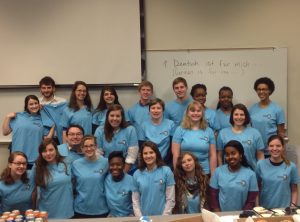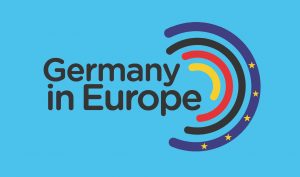
For the second time, the German Program at UNCG participated in German Campus Weeks. The theme for 2013/14 was Germany in Europe. With funding from the German Embassy in Washington DC, the series of events, including a speaker series, a film series, and campus competitions, facilitated a discussion of Germany’s evolving position in a changing Europe and its implications for transatlantic relations.
Our first guest speaker was Paul Michael (Mike) Lützeler (featured below with UNCG students, 02/25/14), Rosa May Distinguished University Professor in the Humanities at Washington University in St. Louis. Mike studied German and English Literature, Philosophy, and History in Berlin, Edinburgh, Vienna, Munich, and Indiana University where he received his Ph.D. in 1972. Mike received numerous fellowships and awards both for his research and his teaching; he is an honorary member of the AATG and received the AATG’s Outstanding Educator Award; he received the German Cross of Merit 1st class and the Austrian Cross of Honor in Arts and Sciences 1st class, the Goethe Medal, and the Humboldt-Forschungspreis; he is a member of two German academies; President of the International Hermann Broch Society; as well as President of the American Friends of the German Literary Archive in Marbach.
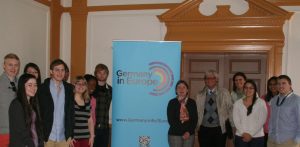
As the author of three books on the idea of Europe in German and European literature, Mike presented an informative and comprehensive talk entitled “The Writers’ Europe: An Imagined Community.” His presentation covered European developments from antiquity to today in order to trace the influence writers and intellectuals exercise in order to promote European unity. The wide range of essays written in numerous languages in the many regions that comprise Europe demonstrate the inherent diversity that has shaped the idea of Europe from the beginning. Mike’s proposal to understand the cultural history of Europe as an attempt to promote peace in Europe sparked a lively debate among members of the audience.
Our second guest speaker, Dr. Marcus Pindur (featured below with UNCG faculty and students, 03/28/14), Correspondent, U.S.A. and Canada for Deutschlandradio, Deutschlandfunk, Deutschlandradio Kultur, and DRadio Wissen, presented a talk entitled “TTIP, NSA-Scandal, Ukraine – conflict and cooperation in US-German Relations.” Dr. Pindur presented a well-received talk on the current state of the transatlantic relationship. His talk began with a sweeping overview of European history from the Thirty Years’ War to 2014, emphasizing once more the critical impact of the Peace of Westphalia in 1648 on European history. Dr. Pindur commented on the recent challenges to the transatlantic relationship, including the NSA scandal that present opportunities to revive and strengthen the ties between the United States and Germany and Europe. Dr. Pindur and the audience consisting of faculty, undergraduate and graduate students, staff, and friends of the German Program engaged in a lively conversation in order to explore the respective perspectives on issues such as security, trade, and the environment.
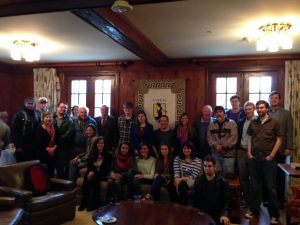
Our third speaker, Mary Nolan (featured below with UNCG faculty and students, 04/11/14) is Professor of History at New York University. She is a specialist in twentieth-century European-American relations and in German History. Her most recent book is The Transatlantic Century: Europe and America, 1890-2010. She is also the author of Visions of Modernity: American Business and the Modernization of Germany and coedited Crimes of War: Guilt and Denial in the Twentieth Century. Recent articles deal with Americanization in Europe, with European anti-Americanism and American Anti-Europeanism, and with the politics of memory in Germany. In 2013 she received the Helmut Schmidt Prize for German-American Economic History, given by the German Historical Institute and the Zeit Foundation Ebelin und Gerd Bucerius.
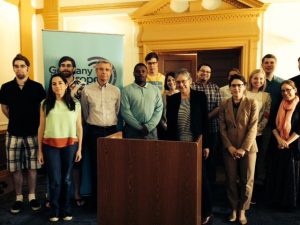
Professor Nolan delivered a talk on “Americanization, Europeanization, Globalization: Germany Since 1945.” Americanization, Europeanization, Globalization–these three capacious and contentious concepts have all been used to understand economic and social developments in Germany since 1945. Professor Nolan’s talk explored presence and limits of Americanization in German business, labor relations, social policy and gender relations, noting its prominence in the first postwar decades. Since the 1970s, however, Nolan argued that Germany is best understood in terms of a Europeanization of its economy, social policy and gender relations. This process has continued after 1980, when American influences diminished and transatlantic conflicts have increased. Despite much talk of globalization, Nolan asserted that Germany remains focused primarily on Europe and globalization is not a useful paradigm in order to understand historical developments in Germany and Europe.
The film series provided another opportunity for students to engage with the question whether Germany is becoming more European or whether Europe is becoming more German. As world history unfolded and put Europe at the center of the attention in the spring, the films provided an opportunity to discuss the importance of a cultural representation in order to negotiate the complex and at times contradictory significance of political and social events and processes.
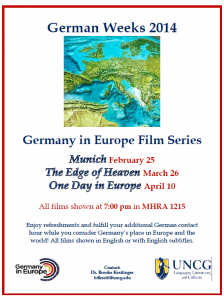
Last, but not least, our most dedicated participants in German Weeks 2013/14: Germany in Europe, had the opportunity to present their work to a faculty panel consisting of Professors Dietkus, Gougeon, Kreitinger, and Rinner, who served as the jury, and their fellow students. Scheduled as a working lunch session, students enjoyed a break from studying on Reading Day and listened to a variety of presentations, including two video submissions. The topics ranged from the European economy and the Transatlantic Trade and Investment Partnership (TTIP) to an analysis of the significance of culture for the formation of a German and European identity. The jury was impressed with the students’ hard work throughout the semester in order to learn more about Germany in Europe. All contributions offered deep analysis, challenging insights, and thoughtful reflection on the past, present, and future of Germany, Europe, and the transatlantic relationship!
The winners in the official competition are:
Marion Siegle for her essay “Can Germany Save Europe?”
Travis French and Zachary Matthews for their policy paper on “TTIP and the Automobile Industry on Both Sides of the Atlantic”
Julia Hallett and Tiffany McCallum for their creative poster submission on the relationship between Germany and Europe!
Student Choice Awards go to:
The video “Für mich, Deutsch ist … “ produced by students in GER 204:
Amani Wainaina, Ari Tanz, Michael Peterson,Jamie Luckhaus, Kelsey Lindeman, Donald Cox, Charlene Grunewald, Alex Holt, Gabriella Rakotovazaha, Iyana Spencer, Jovi Kovacsi-Mile, Dustin Cranford, Anastasia Shymanovich
The video “Germany, Migration, and Europe” produced by students in GER 406: Literature of Migration
Tyra Callaway‘s policy paper on US-German Research Collaboration!
Again, congratulations to everybody who participated and especially to our winners! Your interest in current affairs bodes well for the future of the transatlantic relationship and for a strong partnership between Germany and the United States of America!
